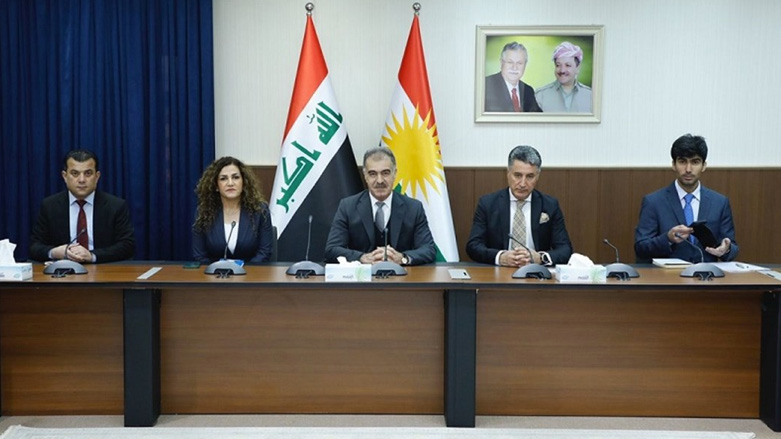Official U.S. Delegation Meets with KRG Foreign Relations Head
Dizayee stressed “the strong partnership” between the KRG and the U.S., including their joint, ongoing actions against terrorism, while he also noted the “current reform programs being undertaken by the KRG.”

WASHINGTON DC, United States (Kurdistan 24) – Safeen Dizayee, head of the Foreign Relations Department of the Kurdistan Regional Government (KRG), met with a U.S. government delegation, accompanied by the U.S. Deputy General Consul in Erbil, Zehra Bell.
Minister Dizayee presented the visiting U.S. officials with “an overview of current developments,” according to a read-out of the meeting from the KRG’s Foreign Relations Department.
Dizayee stressed “the strong partnership” between the KRG and the U.S., including their joint, ongoing actions against terrorism, while he also noted the “current reform programs being undertaken by the KRG.”
The meeting came as Erbil and Baghdad, assisted by the U.S., reached an understanding earlier this week on resuming oil exports from the Kurdistan Region, following an adverse ruling from the Paris-based International Chamber of Commerce’s International Court of Arbitration, which temporarily blocked them.
Read More: U.S. Welcomes Oil Deal between KRG and Federal Government
U.N. Security Council Resolution 688 and Provide Comfort
The meeting also came on the 32nd anniversary of the passage of U.N. Security Council Resolution (UNSCR) 688. The resolution was part of a major shift in U.S. policy at the end of the first Gulf War.
When U.S. President George H. W. Bush called a cease-fire to that war, on Feb. 28, 1991, he believed that Saddam Hussein would be overthrown in a military coup.
That did not happen, of course. Rather, Saddam survived and attacked the populations that had revolted against him: first, the Shiites in the south and then the Kurds in the north.
Fearing Saddam would use chemical weapons against them, most of the Kurdish population—1.5 million people—fled to the mountainous borders with Turkey and Iran, thinking he would not use such banned weapons against them, where the whole world could see.
Yet Bush and his top advisors remained strikingly fixed in their narrow focus on a coup. That only changed after Secretary of State James Baker visited southern Turkey and saw the humanitarian disaster for himself. That paved the way for Operation Provide Comfort, which brought the refugees back home and, in the decade that followed, laid the basis for Kurdish self-government.
Indeed, on Wednesday, KRG Prime Minister Masrour Barzani hailed the anniversary of UNSCR 688, noting the crucial support that it had provided to the Kurdistan Region.
Read More: PM Masrour Barzani pays tribute to the legacy of UN Security Council Resolution 688
In his meeting with U.S. officials, Dizayee similarly “expressed his appreciation to the U.S. and other allies for their contributions to the establishment of a ‘Safe Haven’ and U.N. Security Council Resolution 688,” his office stated.
“Other allies” would certainly include France, which played a key role in securing the passage of UNSCR 688, while it facilitated the change in the U.S. attitude that led to the adoption of that critical resolution.